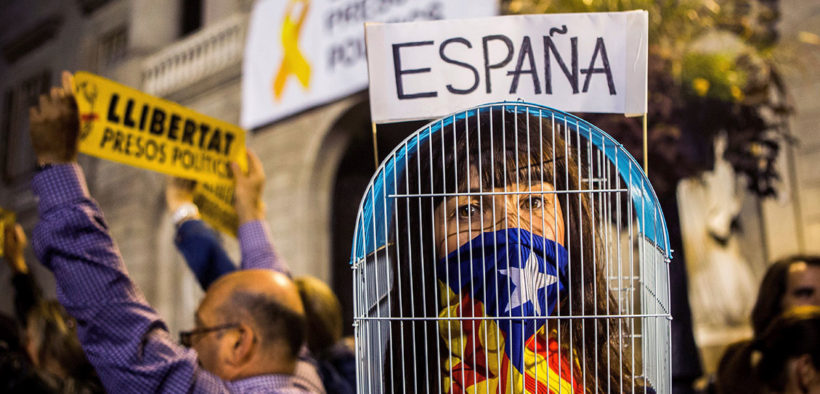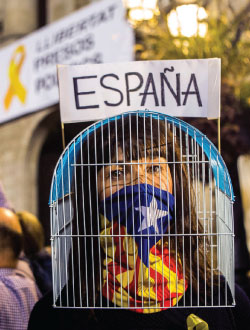“In 2022, Spain…

 André Lecours
André Lecours
…et la Catalogne seront des sociétés divisées, comme elles le sont aujourd’hui. Le processus d’autodétermination qui a débuté en 2012 a forgé un profond clivage dans la société catalane entre indépendantistes et non-indépendantistes. La réponse du gouvernement espagnol, consistant à déclarer illégale toute velléité d’indépendance de la Catalogne, a aliéné bon nombre de Catalans qui traditionnellement se sentaient aussi bien Espagnols que Catalans. En même temps, les initiatives indépendantistes du gouvernement de la Catalogne ont offusqué beaucoup de Catalans qui y ont vu un coup de force anticonstitutionnel.
Ce contexte de division génère des dynamiques bien connues pour les Québécois et les Canadiens. La politique catalane se structure autour de la «question nationale». Elle suscite des conflits entre amis et collègues de travail. Le gouvernement espagnol, pour sa part, explore des avenues de négociations constitutionnelles, mais en même temps sait qu’il jouit d’un appui important à l’extérieur de l’Espagne en faveur de sa défense du statu quo.
Madrid a pris tous les moyens pour empêcher une indépendance qui était toujours très improbable si elle devait être décidée par le biais d’un référendum reconnu officiellement. Ce faisant, il a créé des indépendantistes qui contestent la légitimité même de l’État espagnol en Catalogne. Sans majorité claire pour ou contre l’indépendance, la Catalogne semble vouée à débattre de son avenir politique pendant au moins une génération, tandis que l’Espagne devra donner à cette communauté autonome une attention toute particulière».
» André Lecours est professeur titulaire à l’École d’Études politiques de l’Université d’Ottawa. Il a notamment publié Basque Nationalism and the Spanish State.
La Catalogne semble vouée à débattre de son avenir politique pendant au moins une génération, tandis que l’Espagne devra donner à cette communauté autonome une attention toute particulière
Andres da Silva
…will be recovering from one of the most significant crises it has endured in centuries – one that will shake the foundations of the modern Spanish state. The Catalan crisis, which will almost certainly culminate with the independence of Catalonia, will expose the shortcomings of the Spanish transition to democracy.
As Catalonia transitions to independence, we will have witnessed events that are unsettling in any democratic context – from police brutality to the cancellation of the results of a referendum, to the imprisonment of an elected government for purely political considerations. In 2022, if not earlier, the international community will be urging Spain to modernize and really democratize its country. A reasonable separation of powers, with an independent judiciary, will be the most important reform in this respect – and the one for which there will be the most external and internal pressure. Rule of law cannot exist without it.
In political terms, we will see the erosion of the existing political parties. The failure of Mariano Rajoy’s ruling People’s Party, with the support of the Spanish Socialist Workers’ Party, to meet the demands of the Catalan people head-on will cause Spaniards to demand serious change in the political system. Traditional parties will be doomed to political oblivion.
Finally, the secession of a territory that accounted for about a fifth of Spain’s GDP will bring about a national economic crisis in what remains of Spain, and also economic hardship for Catalonia – at least in the short term. The model around which the Spanish national economy was based – that is, big transfers of fiscal resources from the wealthy to poorer autonomies – will need to be rethought.
For Spain, perhaps the only saving grace will be that the loss of Catalonia may allow the country to reformulate its national project, and ultimately become a properly modern, successful power in Europe and in the ever-complex world of the 21st century.”
» Andres da Silva is a political activist in Barcelona and a member of Catalonia’s ruling Catalan European Democratic Party (PDeCAT).
Jose Lopez Bueno
…will be conditioned by the results of several regional and national elections that will follow the December 2017 regional election in Catalonia. In all probability, Spain will also have a national referendum to modify its 1978 Constitution.
Will the ballots lead to stable governments in the regions – Catalonia included – and in Madrid, or will we be facing weak majorities and/or unstable alliances?
The latest events in Catalonia were preceded by the continuous shrinkage of the CiU-CDC coalition that ruled the region since 1980. In 2010, after 30 years of absolute majority, this centre-right coalition was forced into a desperate alliance with more radical leftist and pro-independence parties in order to stay in power. This alliance finally led to the dissolution of both parties in 2015 (the CiU) and 2016 (the CDC).
The two national parties that have ruled Spain since 1982 – Partido Socialista (PSOE) and Partido Popular (PP) – have suffered a similar fate. They needed two national elections in six months (December 2015 and June 2016) to produce an unstable government requiring the support of three parties. After the elections in Catalonia this December, this fragile coalition will lead to national elections in the winter of 2018 or the spring of 2019. A reform of the Constitution, already announced, will be followed by a referendum, plus a second national election, as mandated for any constitutional reform.
The resulting political panorama might lead to more stable governing majorities. Short-term tactics and opportunism will – one can hope – be reduced substantially.
While creative and dynamic, Spain, like Western countries, has a rapidly ageing population. A 2014 report from Spain’s National Statistics Institute showed that the national population has been decreasing since 2012. From a peak population of 47.3 million in 2012, it fell to 46.5 million in January 2017. Forecasts for the upcoming years deepen this trend of demographic decline.
A smaller population is not necessarily a problem; a smaller and older population is. At 82.8 years, Spain’s life expectancy at birth is among the world’s highest. However, with publicly funded pensions and free health care provided for all Spaniards, an older population means higher public expenditures.
Workers’ contributions are not sufficient to pay for today’s Spanish pensions. As much as 80 percent of the Pensions Reserve Fund has already been exhausted. Since 2012, the government has been forced to withdraw 70 billion Euros from the Pensions Reserve Fund in order to cover current expenditures.
Fewer contributions from active workers to the Pensions Fund (Spain’s unemployment rate is 17.6 percent) plus an increasing number of citizens receiving pensions may soon collapse the pension system. Spain’s ratio of active workers per retired person is approximately two, but projections for the coming decades bring this number closer to unity.
Critiques of the sustainability of the pension system have emerged sporadically in recent years, but they have been overshadowed decisively by the general political turbulence. Lacking longer-term plans, the government has resorted each time to new credits – bref, nothing approaching what is needed to reverse the dark projections for the pensions system and Spain’s ever-worsening public debt position (which is close to 100 percent of GDP).
The policy prescriptions for an exit to these pressures will not come easily, but a solid parliamentary majority and a more stable general political context in the country would give it a far better chance at addressing these deep structural problems.
» Jose Lopez Bueno teaches at the University of Winnipeg and the Manitoba Institute of Trades and Technology. Between 2003 and 2014, he was president of an economic development public corporation of a region of Spain.











